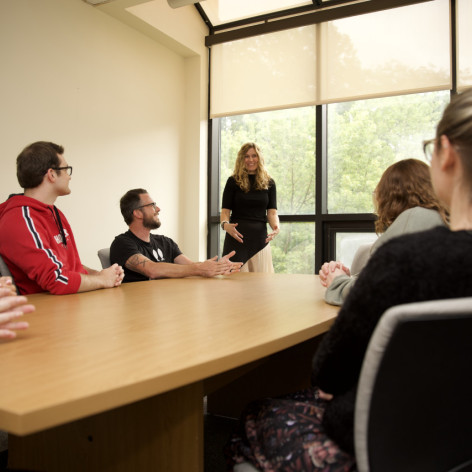Phoenix teaches education majors diversity lessons
FOR RELEASE: Wednesday, February 14, 2007
Huntington, Ind.-Katie Jo Brown sits in the middle of the dull white classroom reading out loud. All around her is a mob of 36 7- and 9-year-olds scrambling on top of her to point out the misplaced silly objects in the book. "Wacky Wednesday was gone when I counted them all," Brown continues to read. "And I even got rid of that shoe on the wall."
The children laugh and wait in anticipation as Brown flips to the next page. Their eyes are wide with wonder as they glance at the colorful pages trying to be the first one to find the hidden pieces. One girl shoves her hand toward the book and whacks Brown on the head as she brushes her finger on the page pointing to a car flying with no wheels. The children jump with glee as they stare at the book ready to pounce on the next page.
Brown, a junior elementary education major from Eaton Rapids, Mich., was one of a group of seven Huntington University students who, along with Kathy Turner, instructor in education, traveled to Arizona over January Term.
The trip was offered to junior students who were required to have a practicum in a minority setting. Students that didn't participate in the multicultural trip later will be placed in a school in Fort Wayne.
For the practicum the students were placed in a classroom and were expected to read "A Framework for Understanding Poverty," to write in their journal daily, to teach in the classroom, to turn in a lesson plan, to be breakfast monitors, to be evaluated by the teacher in the classroom, to help in the after school program and to help the teachers perform their daily activities.
"I taught a lesson about sacrifice and valuable possessions, and I asked the group that I was teaching what their most valuable possession was," said Brown. "A couple of them said my cat, or my Bratz dolls, but one of them said food."
Brown continued the lesson and as she was closing, asked the group if they could give up their most valuable possession.
"I asked the one who said Bratz dolls, and she said, 'I don't think so.' When I asked the girl that said food, she immediately said yes," said Brown. "Some of them have a sacrificial heart. Even though they have been in hard situations their entire life, they want to help people."
The Thomas J. Pappas-Tempe School is a school for homeless or poverty-stricken children. It is a public school that is government funded. This means that the government pays for the teacher's salaries, gives each child their own school supplies, and provides a free breakfast and lunch.
The school then has other funds set up for medical needs. A donation center provides clothes and food for the kids to take home to their families, and there is a doctor and dentist office on school grounds that offers free family check ups.
"We weren't there very long, but we realized that they are just kids and they can't help the fact that they are homeless or that their parents' life is in disarray," said Turner. "They are put into that circumstance. That school is a very, very accepting place."
The school does not have enough money to pay for helpers, so there are regular volunteers that help on Mondays with physical education and music. On the other days, the teachers must occupy their students' attention with lessons, reading and recess.
"In October, the teachers were not receiving pay but continued to go to school each and every day," said Kimberly Crist, a junior elementary education major from Fort Wayne, Ind. "I admire them for their dedication to the school as well as the students."
The teachers have to deal with a language barrier problem. The majority of the students speak Spanish as their primary language. However, English is the only language that is allowed to be spoken in the classroom.
"Most of the students started the year not knowing any English at all. The fact that they come from homes where Spanish is the only language spoken makes teaching them English a long process," said Jennifer Weber, junior elementary and special education major from Edgerton, Ohio. "Even those who are catching onto the English language still struggle with things such as saying 'triangle red' rather than 'red triangle.' Learning new vocabulary daily is very important as well as just talking in conversational English."
The Thomas J. Pappas-Tempe School is one of the few public schools in Arizona that caters to impoverished families. Although the majority of the students choose to go to the school because of the love and support that they bestow upon them. The teachers may have to create stability in the classroom through hard discipline, but in the end the children are only searching for someone who gives them guidance.
"The children need someone to accept them for who they are and that school does a really good job of doing that," said Turner. "They are crying out for someone to give them instruction because I'm sure when they go home, it's just chaos. There are discipline problems, but they just need someone to show them structure."
Huntington University's January Term 2007 offered eight off-campus and 25 on-campus classes spanning two-and-a-half weeks, giving students a chance to delve into a single subject in-depth. January Term began on Jan. 8 and ended Jan. 24.



